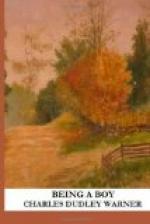He groaned in agony. Besides, he was not to have any supper; it would be very dangerous to eat a morsel. The prospect was appalling. Never was there such a long twilight; never before did he hear so many sounds outdoors that he wanted to investigate. Being ill without any illness was a horrible condition. And he began to have real stomach-ache now; and it ached because it was empty. John was hungry enough to have eaten the New England Primer. But by and by sleep came, and John forgot his woes in dreaming that he knew where Madagascar was just as easy as anything.
It was this lie that came back to John the night he was trying to be affected by the revival. And he was very much ashamed of it, and believed he would never tell another. But then he fell thinking whether, with the “picra,” and the going to bed in the afternoon, and the loss of his supper, he had not been sufficiently paid for it. And in this unhopeful frame of mind he dropped off in sleep.
And the truth must be told, that in the morning John was no nearer to realizing the terrors he desired to feel. But he was a conscientious boy, and would do nothing to interfere with the influences of the season. He not only put himself away from them all, but he refrained from doing almost everything that he wanted to do. There came at that time a newspaper, a secular newspaper, which had in it a long account of the Long Island races, in which the famous horse “Lexington” was a runner. John was fond of horses, he knew about Lexington, and he had looked forward to the result of this race with keen interest. But to read the account of it how he felt might destroy his seriousness of mind, and in all reverence and simplicity he felt it—be a means of “grieving away the Holy Spirit.” He therefore hid away the paper in a table-drawer, intending to read it when the revival should be over. Weeks after, when he looked for the newspaper, it was not to be found, and John never knew what “time” Lexington made nor anything about the race. This was to him a serious loss, but by no means so deep as another feeling that remained with him; for when his little world returned to its ordinary course, and long after, John had an uneasy apprehension of his own separateness from other people, in his insensibility to the revival. Perhaps the experience was a damage to him; and it is a pity that there was no one to explain that religion for a little fellow like him is not a “scheme.”
XVII
WAR
Every boy who is good for anything is a natural savage. The scientists who want to study the primitive man, and have so much difficulty in finding one anywhere in this sophisticated age, couldn’t do better than to devote their attention to the common country-boy. He has the primal, vigorous instincts and impulses of the African savage, without any of the vices inherited from a civilization long ago decayed or developed in an unrestrained barbaric society. You want to catch your boy young, and study him before he has either virtues or vices, in order to understand the primitive man.




